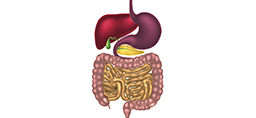
Painful cramps and stomachaches. Frequent diarrhea. Weight loss. Delayed growth and development. Persistent fatigue.
For children with inflammatory bowel disease, these problems are a daily reality. Such symptoms make it hard to have an active life filled with regular school attendance, after-school activities and fun with friends.
Inflammatory bowel disease includes Crohn’s disease and ulcerative colitis, conditions that cause inflammation of the intestines.
The good news for children: There’s hope.
Deborah Cloney, MD, section chief of pediatric gastroenterology at Spectrum Health Helen DeVos Children’s Hospital, regularly sees patients with Crohn’s disease who suffer from severe growth failure, putting them at less than the fifth percentile for height and weight.
Once doctors help them get their gastrointestinal symptoms under control, children come back healthy and active.
“That’s one of the happiest moments in my day,” Dr. Cloney said.
About 1.6 million people in the United States suffer from inflammatory bowel disease. While it can develop at any age, about 5 percent of cases are in children younger than 10, and 25 percent of cases are in children 18 and under.
Dr. Cloney’s 4 tips for getting IBD under control:
1. See a doctor for an accurate diagnosis.
Because the symptoms of inflammatory bowel disease can be mistaken for other childhood ailments, it’s important to see a doctor who can provide an accurate diagnosis.
There are differences between Crohn’s disease and ulcerative colitis, and they call for unique treatments. Both are different from the more commonly known irritable bowel syndrome.
“For a child who was growing normally and then started to slide off the growth curve, maybe without obvious gastrointestinal symptoms other than abdominal pain, they might get treated for other conditions because people aren’t thinking of IBD,” Dr. Cloney said.
A gastroenterologist will look at the child’s symptoms and medical history, as well as conducting a physical examination, which includes an abdominal and rectal exam.
Dr. Cloney said the next step almost always entails bloodwork and stool cultures to check for infection or inflammation. Doctors might order radiology tests, like an upper GI or MRI, to further evaluate the intestine.
Parents can start with their pediatrician or primary care doctor, who will refer the child to a gastroenterologist if they see signs of inflammatory bowel disease, Dr. Cloney said.
2. Start with good nutrition.
Dr. Cloney’s first recommendation is a healthy diet of good, nutritious foods that won’t exacerbate the child’s disease. Children should not miss meals—they should eat regular snacks and perhaps add in a calorie supplement such as Pediasure or Ensure.
Some patients with Crohn’s disease may respond to a primarily liquid diet, including calorie supplements, to control symptoms. For many children, it’s unrealistic to expect them to follow this type of diet long-term. With ulcerative colitis patients, in fact, nutritional therapy alone will not be effective.
A multivitamin is important to make up for any vitamin deficiencies, especially vitamin D. Not only does vitamin D support bone heath and good growth, but evidence shows it might help keep inflammation under control, Dr. Cloney said.
An iron supplement may also be needed to treat children for anemia.
3. Find the right medication.
Medications won’t make inflammatory bowel disease go away, but they can control the symptoms of inflammation, Dr. Cloney said.
Doctors might start with steroid medications to control symptoms, but they are not acceptable for long-term use because of side effects.
Maintenance medications include anti-inflammatories, such as aminosalicylates, also known as ASAs, or immunosuppressant medications. If these aren’t effective, doctors might try the newest form of medications called biologics.
Biologics can offer an advantage in inflammatory bowel disease treatment because they target very specific areas of inflammation, Dr. Cloney said.
While steroids affect the whole body and may create bothersome side effects, biologics act more selectively.
4. Consider the whole child, beyond the physical.
With a chronic, lifelong condition such as inflammatory bowel disease, Dr. Cloney urges parents to pay attention to the child’s psychological and social health as well.
“Kids don’t want to talk about having a gastrointestinal illness,” she said. “Most kids are not very open about that. As much as kids like to joke about GI things, they often don’t want to talk about their own GI symptoms.”
The hospital has social workers and psychologists available to help young patients deal with their emotions, as well as navigate issues that arise with missing a lot of school. The hospital can work with schools, for instance, to make special arrangements for children who need to visit the bathroom often.
There’s a bright future for children when all the pieces come together to control their condition and they’re able to deal with the impacts of the chronic illness, Dr. Cloney said.
She tells the story of a recent patient who was so sick from inflammatory bowel disease that he couldn’t participate in the one thing he loved: football. Once he was healthy, he went on to play collegiate level football as a walk-on.
“That’s just a beautiful thing to see,” she said. “Seeing those kinds of things happen is really rewarding.”
 /a>
/a>
 /a>
/a>
 /a>
/a>